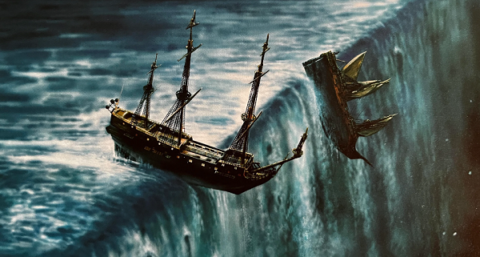David Friedman has encountered a lot of “just so stories” about the customs and practices of earlier cultures and points out that a lot of them are derived from ignorance and arrogance in roughly equal proportion:
My favorite example is the Columbus myth, the idea that the people who argued against Columbus were ignorant flat-earthers who thought his ships would sail off the edge. That is almost the precise opposite of the truth. By the time Columbus set off, a spherical Earth had been the accepted scientific view for well over a thousand years. Columbus’s contemporaries not only knew that the Earth was round, they knew how big around it was, that having been calculated by Eratosthenes in the third century B.C.
By the fifteenth century they also had a reasonably accurate estimate of the width of Asia. Subtracting the one number from the other they could calculate the distance from where Columbus was starting to where Columbus claimed to be going and correctly conclude that it was much farther than his ships could go before running out of food and water. The scientific ignorance was on the side of Columbus and those who believed him; he was claiming a much smaller circumference for the Earth and a much larger width of Asia, hence a much shorter distance from Spain to the far end of Asia. We will probably never know whether he believed his own numbers or was deliberately misrepresenting the geographical facts in order to get funding for his trip in the hope that he would find land somewhere between Spain and Japan, as in fact he did.1
Another example of the same pattern shows up in discussions of medieval cooking, one of my hobbies. Quite a lot of people believe that medieval cooks over spiced their food in order to hide the taste of spoiled meat. A few minutes of thought should be enough to see the consequences for a cook of routinely giving his employer and the employer’s guests food poisoning. Also that, with meat available on the hoof, there was no need to keep it until it spoiled and that it made little sense to save on meat, a local product, at the cost of spices that had to be transported over thousands of miles.
I like to ask people who claim the food was overspiced how they know, given that medieval European recipes almost never give quantities. One possible source for the belief — the overspicing, not the reason for it — is a passage in the introduction to Two Fifteenth Century Cookery Books, a collection published by the Early English Text Society.
Our forefathers, possibly from having stronger stomachs, fortified by outdoor life, evidently liked their dishes strongly seasoned and piquant, as the Cinnamon Soup on p. 59 shews. Pepper, Ginger, Cloves, Garlic, Cinnamon, Galingale, Vinegar, Verjuice, and Wine, appear constantly in dishes where we should little expect them; and even Ale was frequently used in Cookery.
“The cinnamon soup on p. 59” is not a recipe but an entry in a menu, so what the editor is complaining about is not the amount of cinnamon but the fact that it is there at all, and similarly for the rest of his list. That tells us more about English cooking of the 19th century than that of the 15th.
As far as I can tell, there is no evidence that medieval food was overspiced, only that they used spices in different ways than modern European cuisine. I have twice come across evidence on the question. There is a recipe for Hippocras, a spiced wine, in Le Menagier de Paris, a household manual dated to 1490. It is one of the rare recipes with quantities, sugar and spices by the ounce, wine by “quarts of Paris measure”. When I first made it I found the result too sweet and too highly spiced, so cut sugar and spice in half to fit my taste.
Many years later, when I mentioned the recipe in an online discussion, someone asked me whether I had checked the units. I had not, just assumed that a quart was a quart and an ounce an ounce. I was wrong — the period ounce was about an ounce but the quart by Paris measure was about twice our quart. In adjusting the recipe to my taste, I had gotten back to about the original proportions.
1. There is disputed evidence that he visited Iceland and might have heard about the existence of North America there, also speculation that he might have gotten the information from European fishermen. There were European ships harvesting Cod off what is now Newfoundland not long after Columbus, but earlier dates are speculative.




